“I leave with a sense of accomplishment”: Senator Dawson retires
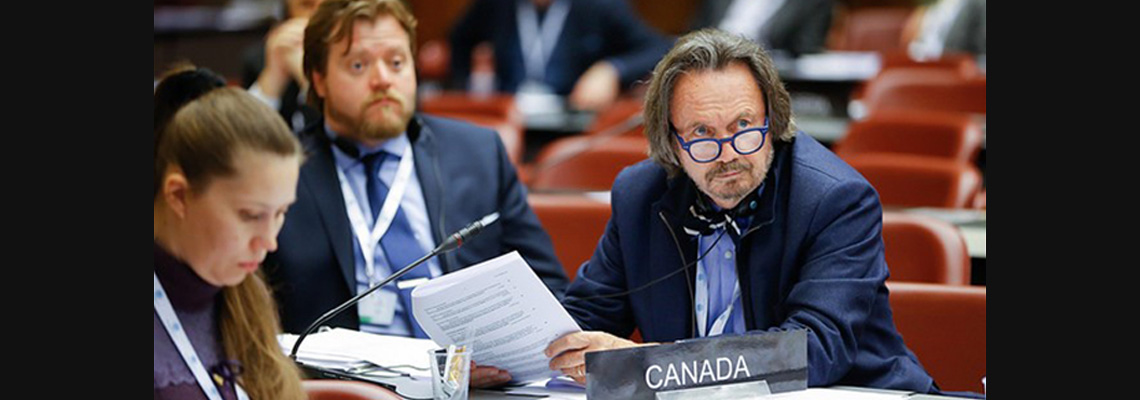
After spending 46 years on or near Parliament Hill — first as a Member of Parliament, then as a consultant and, since 2005, as a senator — Dennis Dawson leaves the Upper House with a sense of accomplishment. Known for speaking his mind, the man with 150 bow ties leaves no one indifferent. A strong advocate for Quebec and Canadian culture, parliamentary diplomacy and security issues, Senator Dawson retired from the Senate on February 9, 2023. This interview looks back on his distinguished career.
After all these years on Parliament Hill, what would you say to your younger self when you became an MP?
I would say to him, “You made a good decision.” If I had wanted to be a political assistant, I could have made a career of it, but I wanted to be in politics.
For you to understand what I mean, I’ll have to explain how I got here. I was president of the Québec City Catholic school board when the MP for my riding passed away. Some party members were pushing for a candidate who was a Liberal Party “bagman.” I was part of a new generation that wanted to move away from that mindset. I interviewed with the Liberal Party’s Quebec lieutenant at the time. He offered me a job in his office, and I told him: “No — if I wanted to work for you, I would have sent you my CV, not a nomination application. I sent in my application because I want to be a member of Parliament.”
I won three straight federal elections in Louis-Hébert, so you could say that it turned out pretty well for me. Politics was a good fit for me, I must say.
You were one of the youngest Members to be elected. Do you have any memories that stand out from when you first arrived at the House of Commons?
I was 27 years old. There were maybe two or three other MPs younger than I was. It was nice to work with people my age, but at some point, you want to be recognized for something else, because youth fades every single day!
Mostly I remember being nervous speaking in front of large groups. Over time, I learned how to give a good speech. It is still a bit nerve-wracking to me now, but I hide it better these days. Back then, it was terrible. I would practically be shaking, but I had ambition, and if I wanted to do what I loved to do, I had to get over it.
What do you think are the main differences between the roles of an MP and a senator?
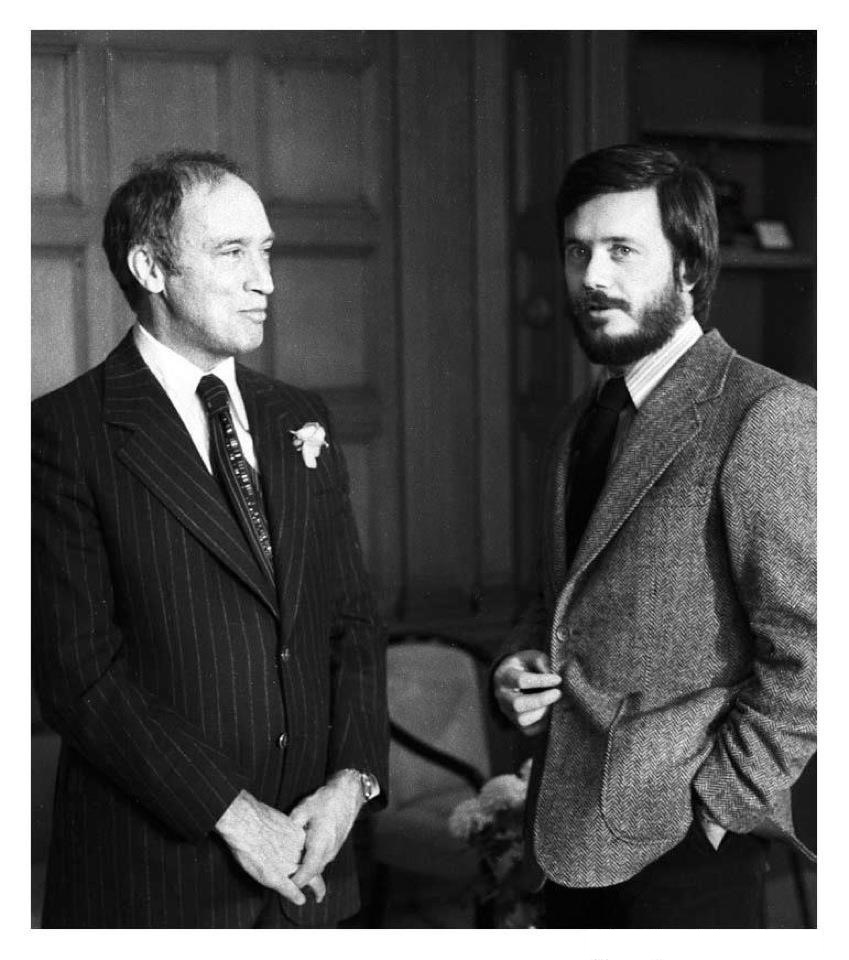
In 1977, at the age of 27, Senator Dennis Dawson was one of the youngest members of Parliament elected under the Liberals of Pierre Elliott Trudeau, left. (Photo Credit: Jean-Marc Carisse)
They are two very different worlds and almost impossible to compare — other than the fact that everyone has to be at Question Period at 2 p.m.!
First of all, an MP definitely has more legitimacy than a senator, even if the Constitution and all the Acts of Parliament put them on an equal footing. Senators have a duty, even an obligation, to provide a sober second thought. However, when our amendments are rejected by the House of Commons, in my opinion, that’s the end of it.
It must also be said that in the last nine years, things have changed in the Senate. In 2014, before Justin Trudeau became Prime Minister, he decided to exclude us from the Liberal caucus. This made me sad. I had spent over 30 years of my life campaigning for the Liberal Party, only to be told that I was no longer allowed to be in my caucus.
I still put in the effort to make an independent Upper House work. Am I happy with the way things are going? Not really, because we could do so much better. We had two choices: to slowly fade away or to restructure and carve out a new role for ourselves. We created the Progressive Senate Group and I am very proud of it. This group has brought some balance to the Senate.
One of the biggest differences is that new senators are no longer supported by a party, so they have no one to show them the ropes. Some refuse to meet with lobbyists, for example. Yet that is such an important aspect of our role! No one has shown them that it is perfectly normal; you have to know both sides of the story before you can reflect and make a decision.
Experienced senators should mentor new ones, something that used to be done and that I have continued to do, because I think it makes a difference.
You are the only parliamentarian to have experienced the first broadcast of both the House of Commons in 1977 and then the Senate in 2019. What memories do you have of these significant moments in parliamentary history?
I will always remember my first televised speech. A few months after I arrived in Ottawa as an MP, I was asked to respond to the Speech from the Throne, which was read by Queen Elizabeth II in October 1977.
I was a Quebec nationalist, not at all a monarchist, but thank-you speeches were necessary. All the MPs had left the House of Commons to go to the Senate to hear the Queen’s speech. Then they came back to the House, and I was the first person to give a thank-you speech, the first televised speech. I was quite nervous! In those days, MPs used to bang on their desks instead of applauding. You can’t say it made for good television. Shortly after the first televised sittings, the Liberal caucus communications team advised our MPs to change their behaviour in the House and to pay closer attention to what was happening. For example, when the camera was on the MP speaking in front of you, that was not the time to chat with the person next to you!
I fought to have the proceedings of the Senate Chamber televised for a number of reasons, one being that I hoped it would encourage senators to improve their behaviour.
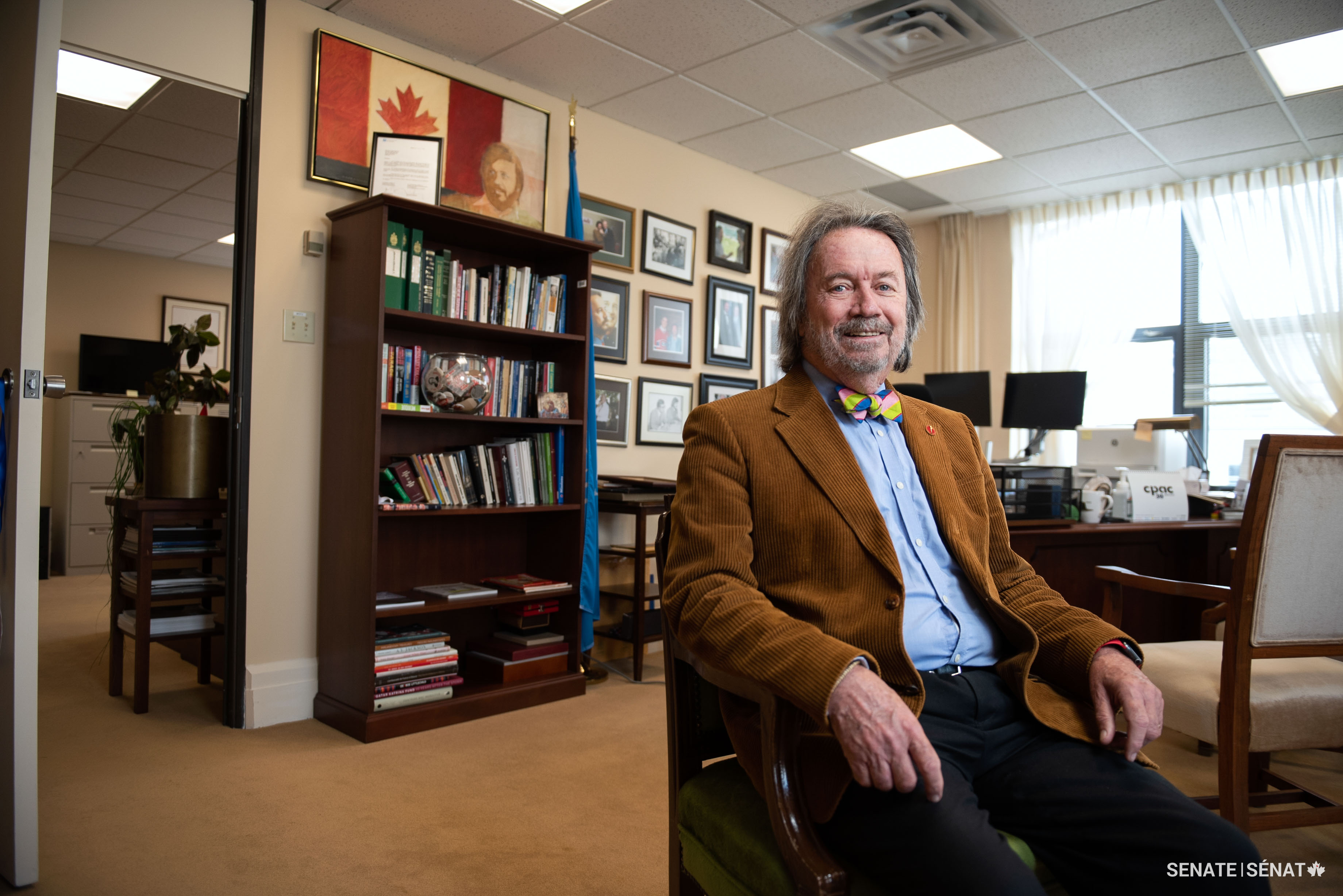
Senator Dawson sitting in an old House of Commons chair, a gift from one of his daughters.
Looking back, do you think the debates in the Red Chamber changed once they were televised?
Yes, behaviours have changed; senators are more aware that it is an important communication tool. Unfortunately, some parliamentarians use it to put on a show.
In the Senate, a commitment was made, which has not yet been fulfilled, to change the rules to make the sittings more interesting. When someone says more than 40 times between 2 p.m. and 4 p.m. that an item is deferred, it’s boring. The schedule is also unreliable because it is impossible to know what will happen and when. If it says there will be a speech on subject X at 3 p.m., there is no way to know if it will actually happen at that time. Also, when the bells ring for an hour before a vote, it does nothing to improve the image of the Senate. Without a change to the rules, it will be difficult to better communicate what is being done in the Senate Chamber. At least when the proceedings are broadcast, we have clips that we can use on social media, which is already an improvement.
Of your entire career on Parliament Hill, what initiatives are you most proud of?
I participated in two audits of communications services in the Senate. The second one was done with the help of consultants. This led to the release of a report that empowered the Committee on Internal Economy, Budgets and Administration to restructure the Communications Directorate. As a result, we have a better communications service. The Senate and senators look much better! We still have a long way to go, but we are making progress. I have no illusions about our ability to change the Senate’s image, but I am very proud of the work we have done to improve this service.
I am also proud that the Senate passed Bill C-11, the Online Streaming Act, which I have long supported. I even published an article in 1982 in which I said that the Telecommunications Act needed to be improved. The Act was improved in 1990, but this need is even more pressing today. Many do not believe in the Canadian Radio-television and Telecommunications Commission, but we need this organization to protect Canadian culture!
Lastly, I am proud of the Transport and Communications Committee’s study on automated vehicles even though it was premature and overly ambitious. Our focus was on smart cars instead of smarter cars... so the majority of the report’s recommendations were implemented by the industry fairly quickly.
I am also very proud of the report by this same committee on air transport. The study indicated that if nothing changes in how airports operate, we are headed for disaster. Indeed, with the pandemic, we have seen how dysfunctional airports are!
You have dedicated a lot of time to parliamentary diplomacy. Why was that so important to you?
I spent a lot of time with various parliamentary associations because their role is important.
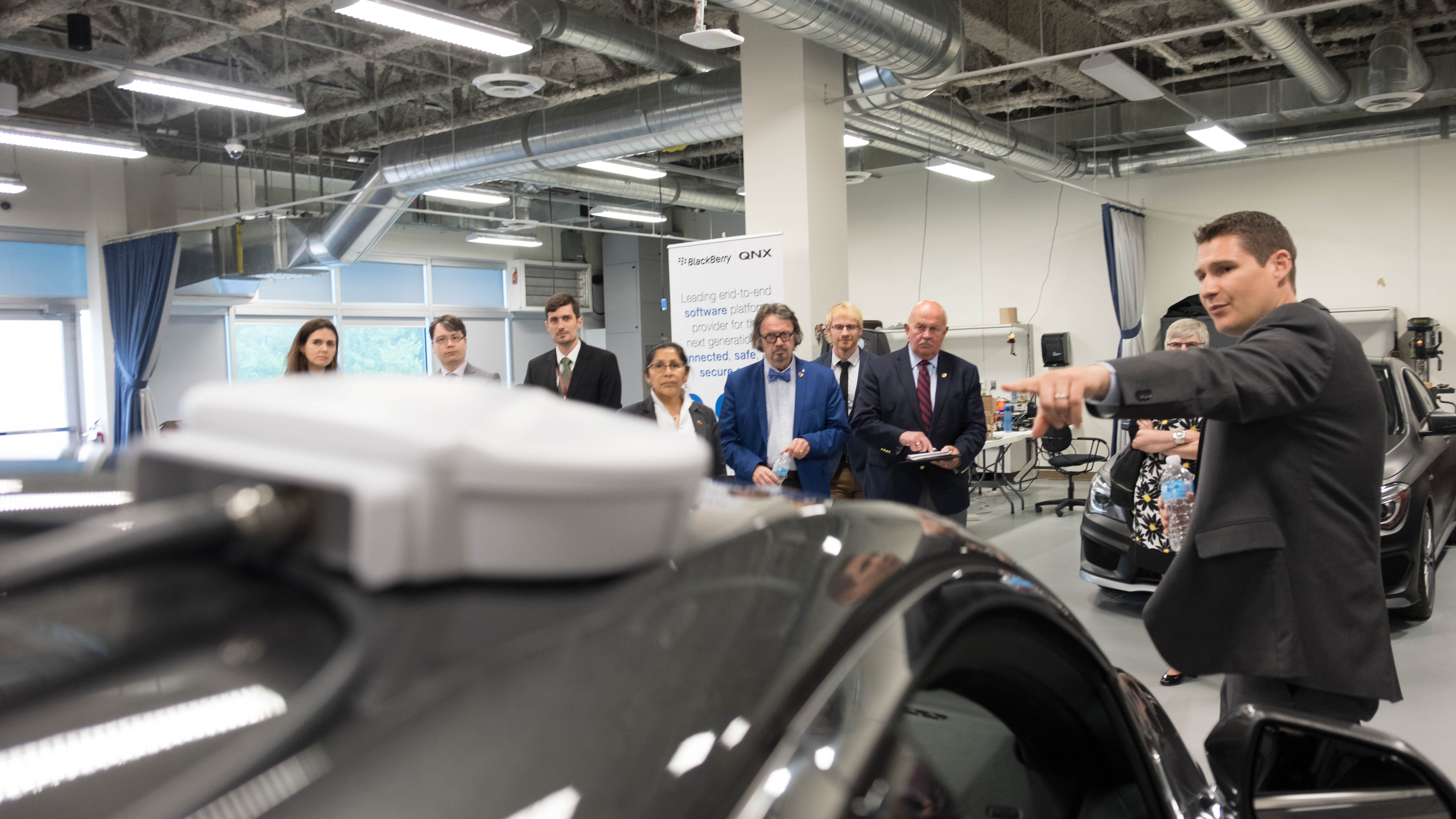
Senator Galvez, fourth from left, Senator Dawson, centre, and former Senator Mercer, third from right, during a fact-finding mission on automated vehicles.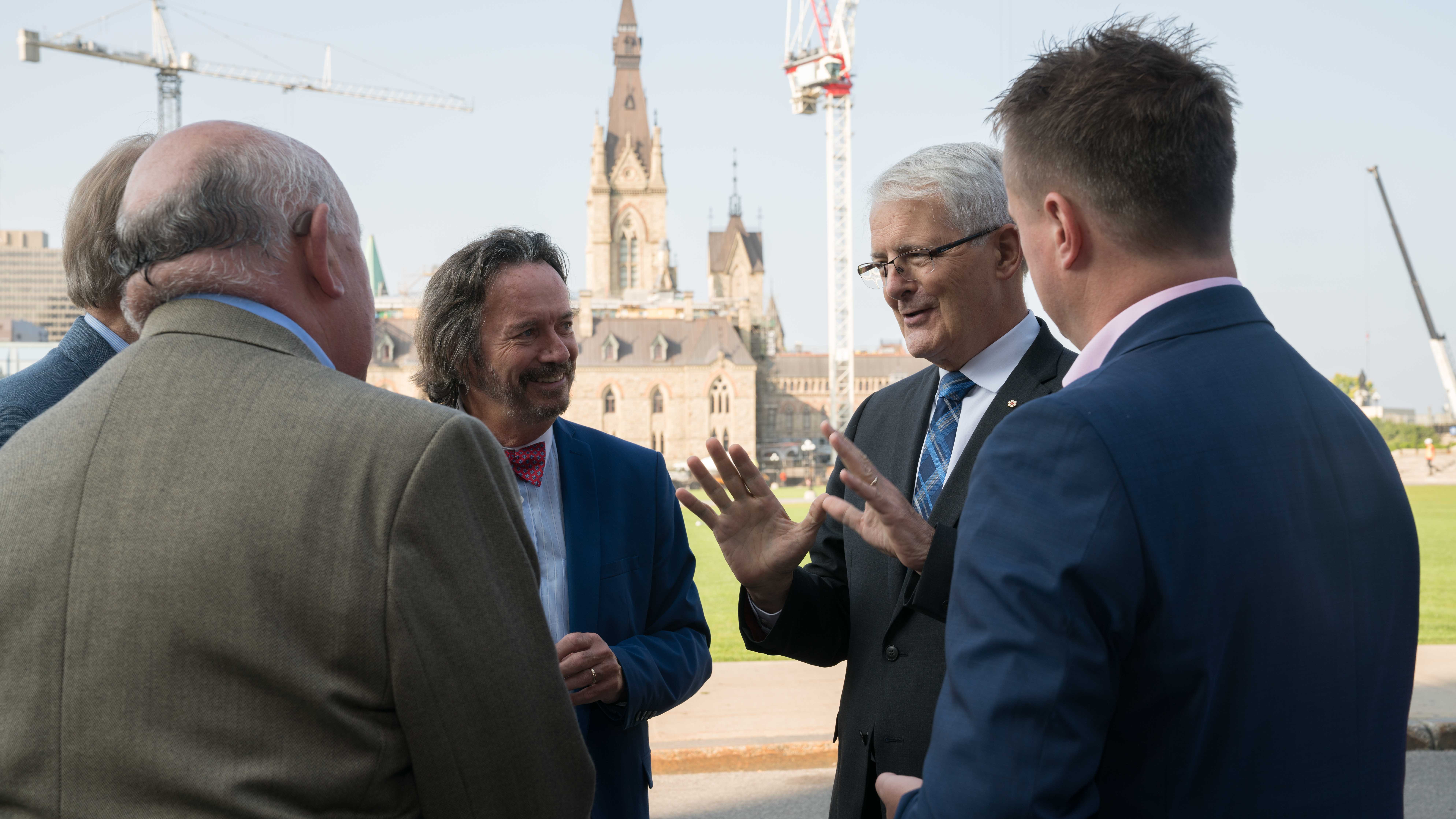 Senator Dawson, then the Deputy Chair of the Transport and Communications Committee, talks with Marc Garneau, then federal Minister of Transport, at an automated vehicle demonstration on Parliament Hill in September 2017.
Senator Dawson, then the Deputy Chair of the Transport and Communications Committee, talks with Marc Garneau, then federal Minister of Transport, at an automated vehicle demonstration on Parliament Hill in September 2017.
For example, when it came time for the free-trade negotiations with the United States, a delegation of MPs and senators from all parties met with American Members of Congress and senators to explain why the agreement is so important, despite President Trump’s reluctance. It was imperative to convince Congress to keep the pressure on.
The establishment of the Organisation internationale de la Francophonie (OIF) is an achievement of the Assemblée parlementaire de la Francophonie. The OIF has made sure that today we have a much healthier Francophonie, whereas previously France had quite a monopoly.
You worked for many years in the Centre Block on Parliament Hill before the building was closed for rehabilitation. What changes have you seen?
It may seem like a minor thing, but when we shared the same cafeteria, the same hallways, the same meeting rooms, MPs and senators talked to each other more. When Prime Minister Trudeau kicked us out of caucus, it was quite a shock, because senators could no longer participate in Liberal Party caucus meetings. In addition, we moved into two separate buildings, far from each other.
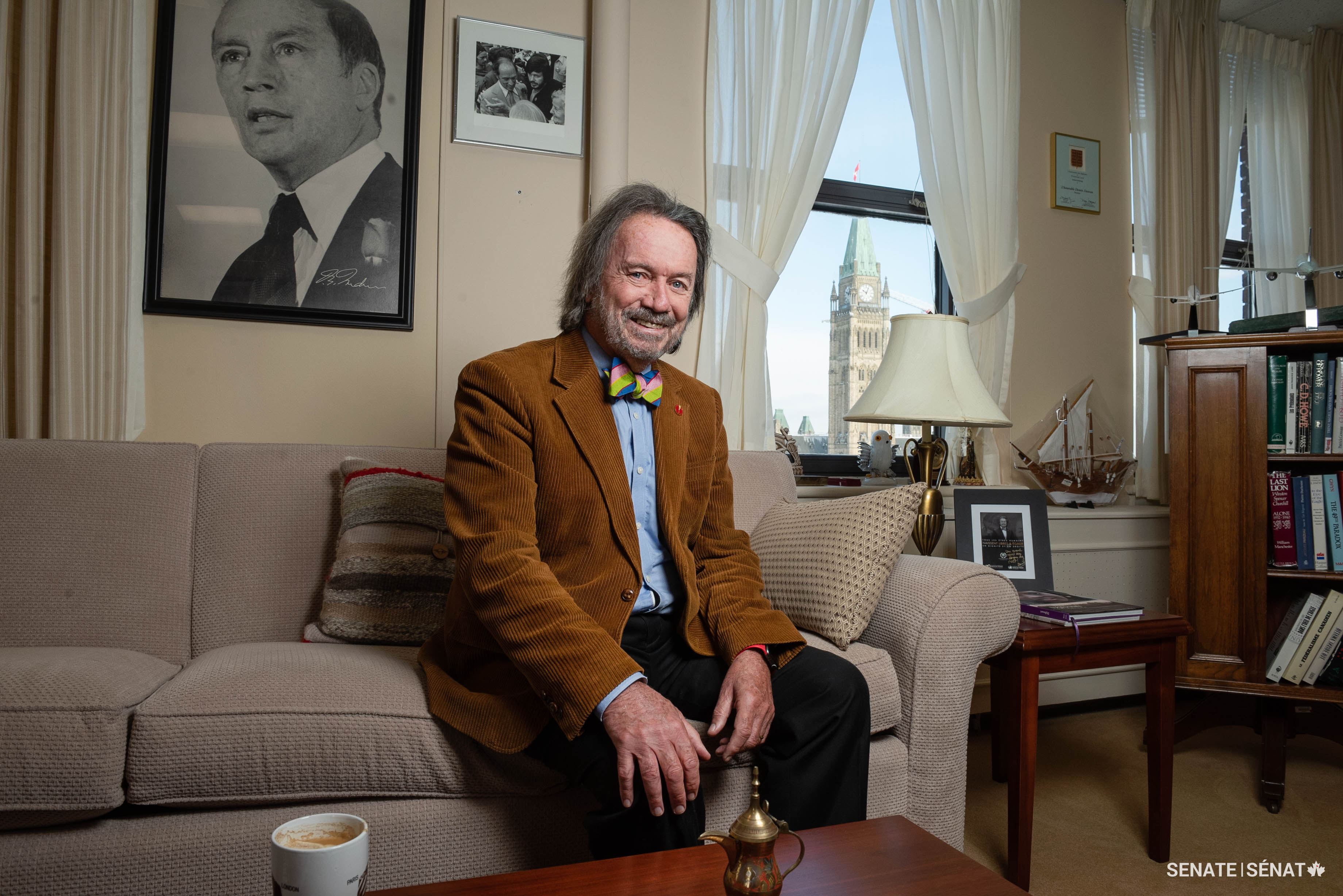
Senator Dawson in his office on Parliament Hill, with a great view of Centre Block that is currently undergoing major rehabilitation.
Then came the pandemic, and meetings went virtual. Many senators have never seen a member of Parliament. In the old days, we would run into each other in the cafeteria and talk about a file and come up with some workable ideas on the fly. Now, a formal meeting request has to be made. Needless to say, it changes the dynamic; there is no such thing as spontaneity anymore. I hope that our leaders will figure out better ways to share the information that parliamentarians need to do their work.
Your mandatory retirement is not until 2024. Why did you decide to leave the Senate early?
I have been in Ottawa for over 40 years, four days a week. During the pandemic, I spent two years at home with my wife, who was used to having me home only half the time. I must admit that it was very nice to be with her full time. I found it difficult when I returned to the Senate in person last September, not to mention that there are no longer any direct flights from Québec City to Ottawa. You have to connect through Montréal or Toronto, so you waste even more time sitting in airports.
There’s also the fact that I don’t like the atmosphere of the current Senate as much, not to mention that Senate committees are starting new studies, and I knew I was going to have to leave before the final product would be delivered. In short, all these factors led me to make this decision.
What’s next?
Honestly, it’s a big question mark. I will continue to volunteer on several committees and boards of directors in Québec City. As for the rest, I plan to spend time with my family, especially with my granddaughter, who just turned three months old. I have to admit, I am gaga over her!

One reason Senator Dawson took an early retirement after more than 40 years on Parliament Hill was because he wanted to spend more time with his family, including his granddaughter June. (Photo credit: Office of Senator Dennis Dawson)
Learn more about Senator Dennis Dawson in this article on SenCAplus.
The Honourable Dennis Dawson retired from the Senate of Canada in February 2023. Visit the Library of Parliament's Parlinfo website to learn more about his work in Parliament.
Related articles
Tags
Committee news
“I leave with a sense of accomplishment”: Senator Dawson retires

After spending 46 years on or near Parliament Hill — first as a Member of Parliament, then as a consultant and, since 2005, as a senator — Dennis Dawson leaves the Upper House with a sense of accomplishment. Known for speaking his mind, the man with 150 bow ties leaves no one indifferent. A strong advocate for Quebec and Canadian culture, parliamentary diplomacy and security issues, Senator Dawson retired from the Senate on February 9, 2023. This interview looks back on his distinguished career.
After all these years on Parliament Hill, what would you say to your younger self when you became an MP?
I would say to him, “You made a good decision.” If I had wanted to be a political assistant, I could have made a career of it, but I wanted to be in politics.
For you to understand what I mean, I’ll have to explain how I got here. I was president of the Québec City Catholic school board when the MP for my riding passed away. Some party members were pushing for a candidate who was a Liberal Party “bagman.” I was part of a new generation that wanted to move away from that mindset. I interviewed with the Liberal Party’s Quebec lieutenant at the time. He offered me a job in his office, and I told him: “No — if I wanted to work for you, I would have sent you my CV, not a nomination application. I sent in my application because I want to be a member of Parliament.”
I won three straight federal elections in Louis-Hébert, so you could say that it turned out pretty well for me. Politics was a good fit for me, I must say.
You were one of the youngest Members to be elected. Do you have any memories that stand out from when you first arrived at the House of Commons?
I was 27 years old. There were maybe two or three other MPs younger than I was. It was nice to work with people my age, but at some point, you want to be recognized for something else, because youth fades every single day!
Mostly I remember being nervous speaking in front of large groups. Over time, I learned how to give a good speech. It is still a bit nerve-wracking to me now, but I hide it better these days. Back then, it was terrible. I would practically be shaking, but I had ambition, and if I wanted to do what I loved to do, I had to get over it.
What do you think are the main differences between the roles of an MP and a senator?

In 1977, at the age of 27, Senator Dennis Dawson was one of the youngest members of Parliament elected under the Liberals of Pierre Elliott Trudeau, left. (Photo Credit: Jean-Marc Carisse)
They are two very different worlds and almost impossible to compare — other than the fact that everyone has to be at Question Period at 2 p.m.!
First of all, an MP definitely has more legitimacy than a senator, even if the Constitution and all the Acts of Parliament put them on an equal footing. Senators have a duty, even an obligation, to provide a sober second thought. However, when our amendments are rejected by the House of Commons, in my opinion, that’s the end of it.
It must also be said that in the last nine years, things have changed in the Senate. In 2014, before Justin Trudeau became Prime Minister, he decided to exclude us from the Liberal caucus. This made me sad. I had spent over 30 years of my life campaigning for the Liberal Party, only to be told that I was no longer allowed to be in my caucus.
I still put in the effort to make an independent Upper House work. Am I happy with the way things are going? Not really, because we could do so much better. We had two choices: to slowly fade away or to restructure and carve out a new role for ourselves. We created the Progressive Senate Group and I am very proud of it. This group has brought some balance to the Senate.
One of the biggest differences is that new senators are no longer supported by a party, so they have no one to show them the ropes. Some refuse to meet with lobbyists, for example. Yet that is such an important aspect of our role! No one has shown them that it is perfectly normal; you have to know both sides of the story before you can reflect and make a decision.
Experienced senators should mentor new ones, something that used to be done and that I have continued to do, because I think it makes a difference.
You are the only parliamentarian to have experienced the first broadcast of both the House of Commons in 1977 and then the Senate in 2019. What memories do you have of these significant moments in parliamentary history?
I will always remember my first televised speech. A few months after I arrived in Ottawa as an MP, I was asked to respond to the Speech from the Throne, which was read by Queen Elizabeth II in October 1977.
I was a Quebec nationalist, not at all a monarchist, but thank-you speeches were necessary. All the MPs had left the House of Commons to go to the Senate to hear the Queen’s speech. Then they came back to the House, and I was the first person to give a thank-you speech, the first televised speech. I was quite nervous! In those days, MPs used to bang on their desks instead of applauding. You can’t say it made for good television. Shortly after the first televised sittings, the Liberal caucus communications team advised our MPs to change their behaviour in the House and to pay closer attention to what was happening. For example, when the camera was on the MP speaking in front of you, that was not the time to chat with the person next to you!
I fought to have the proceedings of the Senate Chamber televised for a number of reasons, one being that I hoped it would encourage senators to improve their behaviour.

Senator Dawson sitting in an old House of Commons chair, a gift from one of his daughters.
Looking back, do you think the debates in the Red Chamber changed once they were televised?
Yes, behaviours have changed; senators are more aware that it is an important communication tool. Unfortunately, some parliamentarians use it to put on a show.
In the Senate, a commitment was made, which has not yet been fulfilled, to change the rules to make the sittings more interesting. When someone says more than 40 times between 2 p.m. and 4 p.m. that an item is deferred, it’s boring. The schedule is also unreliable because it is impossible to know what will happen and when. If it says there will be a speech on subject X at 3 p.m., there is no way to know if it will actually happen at that time. Also, when the bells ring for an hour before a vote, it does nothing to improve the image of the Senate. Without a change to the rules, it will be difficult to better communicate what is being done in the Senate Chamber. At least when the proceedings are broadcast, we have clips that we can use on social media, which is already an improvement.
Of your entire career on Parliament Hill, what initiatives are you most proud of?
I participated in two audits of communications services in the Senate. The second one was done with the help of consultants. This led to the release of a report that empowered the Committee on Internal Economy, Budgets and Administration to restructure the Communications Directorate. As a result, we have a better communications service. The Senate and senators look much better! We still have a long way to go, but we are making progress. I have no illusions about our ability to change the Senate’s image, but I am very proud of the work we have done to improve this service.
I am also proud that the Senate passed Bill C-11, the Online Streaming Act, which I have long supported. I even published an article in 1982 in which I said that the Telecommunications Act needed to be improved. The Act was improved in 1990, but this need is even more pressing today. Many do not believe in the Canadian Radio-television and Telecommunications Commission, but we need this organization to protect Canadian culture!
Lastly, I am proud of the Transport and Communications Committee’s study on automated vehicles even though it was premature and overly ambitious. Our focus was on smart cars instead of smarter cars... so the majority of the report’s recommendations were implemented by the industry fairly quickly.
I am also very proud of the report by this same committee on air transport. The study indicated that if nothing changes in how airports operate, we are headed for disaster. Indeed, with the pandemic, we have seen how dysfunctional airports are!
You have dedicated a lot of time to parliamentary diplomacy. Why was that so important to you?
I spent a lot of time with various parliamentary associations because their role is important.

Senator Galvez, fourth from left, Senator Dawson, centre, and former Senator Mercer, third from right, during a fact-finding mission on automated vehicles. Senator Dawson, then the Deputy Chair of the Transport and Communications Committee, talks with Marc Garneau, then federal Minister of Transport, at an automated vehicle demonstration on Parliament Hill in September 2017.
Senator Dawson, then the Deputy Chair of the Transport and Communications Committee, talks with Marc Garneau, then federal Minister of Transport, at an automated vehicle demonstration on Parliament Hill in September 2017.
For example, when it came time for the free-trade negotiations with the United States, a delegation of MPs and senators from all parties met with American Members of Congress and senators to explain why the agreement is so important, despite President Trump’s reluctance. It was imperative to convince Congress to keep the pressure on.
The establishment of the Organisation internationale de la Francophonie (OIF) is an achievement of the Assemblée parlementaire de la Francophonie. The OIF has made sure that today we have a much healthier Francophonie, whereas previously France had quite a monopoly.
You worked for many years in the Centre Block on Parliament Hill before the building was closed for rehabilitation. What changes have you seen?
It may seem like a minor thing, but when we shared the same cafeteria, the same hallways, the same meeting rooms, MPs and senators talked to each other more. When Prime Minister Trudeau kicked us out of caucus, it was quite a shock, because senators could no longer participate in Liberal Party caucus meetings. In addition, we moved into two separate buildings, far from each other.

Senator Dawson in his office on Parliament Hill, with a great view of Centre Block that is currently undergoing major rehabilitation.
Then came the pandemic, and meetings went virtual. Many senators have never seen a member of Parliament. In the old days, we would run into each other in the cafeteria and talk about a file and come up with some workable ideas on the fly. Now, a formal meeting request has to be made. Needless to say, it changes the dynamic; there is no such thing as spontaneity anymore. I hope that our leaders will figure out better ways to share the information that parliamentarians need to do their work.
Your mandatory retirement is not until 2024. Why did you decide to leave the Senate early?
I have been in Ottawa for over 40 years, four days a week. During the pandemic, I spent two years at home with my wife, who was used to having me home only half the time. I must admit that it was very nice to be with her full time. I found it difficult when I returned to the Senate in person last September, not to mention that there are no longer any direct flights from Québec City to Ottawa. You have to connect through Montréal or Toronto, so you waste even more time sitting in airports.
There’s also the fact that I don’t like the atmosphere of the current Senate as much, not to mention that Senate committees are starting new studies, and I knew I was going to have to leave before the final product would be delivered. In short, all these factors led me to make this decision.
What’s next?
Honestly, it’s a big question mark. I will continue to volunteer on several committees and boards of directors in Québec City. As for the rest, I plan to spend time with my family, especially with my granddaughter, who just turned three months old. I have to admit, I am gaga over her!

One reason Senator Dawson took an early retirement after more than 40 years on Parliament Hill was because he wanted to spend more time with his family, including his granddaughter June. (Photo credit: Office of Senator Dennis Dawson)
Learn more about Senator Dennis Dawson in this article on SenCAplus.
The Honourable Dennis Dawson retired from the Senate of Canada in February 2023. Visit the Library of Parliament's Parlinfo website to learn more about his work in Parliament.


